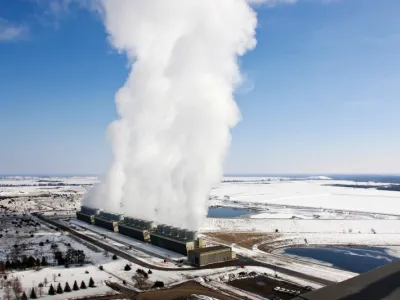Xcel's proposed plan: Good progress on clean energy, but for consumers, the devil is in the details

Published May 21, 2019 Yesterday, clean energy and labor organizations joined with Xcel Energy to propose that Xcel close its remaining coal plants in Minnesota by 2030, more than triple its solar power capacity, increase wind power, and make a strong commitment to energy efficiency. In addition, Xcel would purchase the Mankato Energy Center gas power plant. CUB applauds Xcel’s leadership for clean, affordable energy, as we did when Xcel initially announced its clean energy vision more than a year ago. And, though this deal falls short of Xcel’s previously announced carbon goals, the clean energy and labor organizations who partnered with Xcel to bring forward this proposal deserve congratulations for getting it formally on the record. And now, of course, for the details.
The agreement that grabbed headlines yesterday is limited to the question of who should own the Mankato Energy Center.
The clean energy and labor groups have not signed onto Xcel’s full plan for providing energy. Indeed, neither they, CUB, nor any outside parties had seen the full plan until an outline was presented at a public meeting at Xcel headquarters yesterday, hours after the deal was announced. Rather, the advocates agreed to support a request by Xcel to purchase the Mankato Energy Center (MEC), a 720-megawatt gas plant owned by financially troubled Southern Company. MEC is already built and currently generating power. Under any owner, the plant will continue to run and supply power to Xcel customers. The question before the Minnesota Public Utilities Commission is whether it’s in the public interest for Xcel to purchase the plant – at a price of $650 million, versus the $407 million it sold for in 2016 – and to earn a 9% to 10% return on that investment, or if customers would be better off if the plant were purchased by a third party.
You can’t separate one power plant decision from the full picture, and this agreement underscores that.
Every power plant, solar development, and energy efficiency project affects the others. Beyond MEC, the deal Xcel struck with advocates includes solar, energy efficiency, the manner in which existing coal plant will be operated, jobs considerations, and more. All of these elements will be part of Xcel’s “integrated resource plan,” or IRP, a plan that Minnesota utilities are required to file laying out how they will meet customers’ energy needs for the next 15 years. Xcel released a preview of its preferred IRP yesterday, and it will submit a complete plan to the PUC on July 1.
The integrated resource planning process is vital to protect consumers.
Perhaps a more boring sentence has never been written. But these dry regulatory processes are absolutely crucial to consumer protection. Every dollar Xcel spends on energy resources comes from its ratepayers, and the company stands to profit considerably from those investments. That’s why Xcel is required to show its work, and the IRP is where that happens. It is the opportunity for the PUC and parties like CUB to look under the hood and make sure, all told, that customers get the best deal.
The decision on MEC should be a part of the integrated resource planning process.
Owning the MEC gas plant may help Xcel retire its coal plants ahead of schedule (which is why these environmental groups support it). But there’s no way to evaluate that claim without seeing the full picture of all Xcel’s and its customers’ energy resources, and how each fits into an optimized system. Maybe it makes financial sense for Xcel to purchase gas for the length of their current contract for power from MEC, but not for the longer period of time it could take to pay down debt from purchasing the plant outright. Maybe some combination of energy efficiency, solar, a smaller amount of gas, and/or other options would be less expensive. The PUC’s decision on MEC affects their decisions on whether to continue running the nuclear plants, how much solar should be built, and how much energy efficiency Xcel should pursue. It’s all connected. Taking MEC off the table ahead of the IRP would limit the scope of the “full” picture considered in the IRP and make it difficult, if not impossible, for the PUC to make the best decisions for the public interest. Late last year, Xcel delayed its integrated resource plan filing (with no mention of its intention to purchase MEC). Had the IRP proceeded on schedule, it would have been underway nearly six months ago, and we would be able to see the pros and cons of purchasing MEC in the broader context. Moving forward with a single element now, outside the IRP, will likely end up with consumers in a bad position.
So, looking forward to the IRP….
When CUB reviews Xcel’s proposed integrated resource plan, we’ll look for things like minimizing the degree to which ratepayers are on the hook for long-term debt in power plants, maximizing cost-effective energy efficiency and demand response programs that compensate customers for shifting use to low-demand hours, and making sure that ratepayers get competitive prices for all of the power generation they purchase. (Additionally, yesterday’s deal would guarantee that Xcel shareholders will earn back the full amount of outstanding debt on the closing coal plants – slashing their risk – with no mention of cutting the profits they earn for taking on that risk. We’ll certainly have our eye on that, but that’s a topic for another post.) Xcel is to be applauded for bold progress on environmental goals. It is leading the nation on retiring coal and providing carbon-free energy. However, many details remain to be filled in on how to achieve this vision in the manner that’s best for consumers. CUB looks forward to working with Xcel and with all Minnesotans to bring clean energy and bill savings to customers. We’ll keep you updated as the process moves forward.